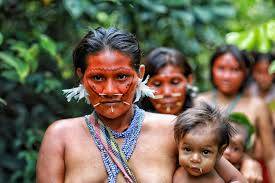The Yanomami, a resilient indigenous group residing in the heart of the Amazon rainforest, offer us a fascinating glimpse into their distinctive way of life. Hailing primarily from Brazil and Venezuela, the Yanomami stand as the largest isolated native community in South America, boasting a population of around 35,000.
What sets the Yanomami apart is their profound connection with nature and the deep-rooted traditions that shape their rich and diverse culture. While they do not possess a written language, their oral traditions, comprising myths, legends, songs, and stories, are both intricate and elaborate. This oral heritage serves as a conduit for preserving their collective wisdom.
Intriguingly, the Yanomami do not just cultivate their traditions but also engage in slash-and-burn agriculture. This practice entails clearing small forest patches by cutting and burning vegetation before planting a variety of crops, including plantains, cassava, corn, and tobacco. To maintain the land's fertility, they rotate their cultivated fields every few years.
Their communal living arrangements take place in shabonos, large circular structures fashioned from natural materials such as wood, vines, and palm leaves. These unique dwellings can host up to 400 people, living in distinct family units that occupy separate sections within the shabono. The shabono serves as both a social hub and a space for ceremonies in their village.
The Yanomami boast an intricate system of kinship and social organization, regulating their interactions and alliances with neighboring groups. While they don't have a single chief or leader, a village headman or tuxawa plays a crucial role in resolving disputes, both within their community and beyond. Additionally, shamans or healers are pivotal figures who communicate with spirits and perform essential rituals for healing and protection.
A remarkable aspect of the Yanomami culture is their profound spiritual connection with the natural and supernatural worlds. Their belief system encompasses spirits inhabiting the forests, rivers, sky, and the underworld. They place great faith in the abilities of shamans, who facilitate communication with these spirits and engage in healing practices. Moreover, the use of hallucinogenic plants like yopo and ebene is common among the Yanomami, allowing them to induce visions and access the spirit realm for various purposes.
Intriguingly, the Yanomami practice endocannibalism, where they consume the flesh of their deceased loved ones. For them, this ritual is a means of honouring the departed and preserving their memory. They believe it safeguards their souls from malevolent spirits and strengthens the bonds within the living community.
What's most captivating about the Yanomami's lifestyle is their diet. Rooted in the resources of the rainforest, it's marked by a deep respect for nature. Their dietary habits, different from the Western-influenced diets of neighboring tribes like the Yekwana, primarily rely on forest resources. Their foods are low in fat and salt, high in fiber and antioxidants, and unseasoned except for the inclusion of hot peppers.
This unique diet carries immense health benefits for the Yanomami. Studies reveal that they maintain low blood pressure levels throughout their lives, unlike most other global populations. They also exhibit low obesity rates and are generally free from atherosclerosis and other chronic diseases. These dietary factors contribute to their longevity and vitality.
The Yanomami's culinary choices offer a glimpse into their harmonious coexistence with the natural world. Their profound knowledge of the surrounding plants and animals is deeply intertwined with their respect and protection of these life sources. The Yanomami's diet stands as a testament to how humans can live in harmony with nature and reap the rewards of its offerings. Their lifestyle is a reflection of their culture's essence, where every aspect, from traditions to diet, resonates with the environment they call home.




No comments yet
Be the first to share your thoughts!